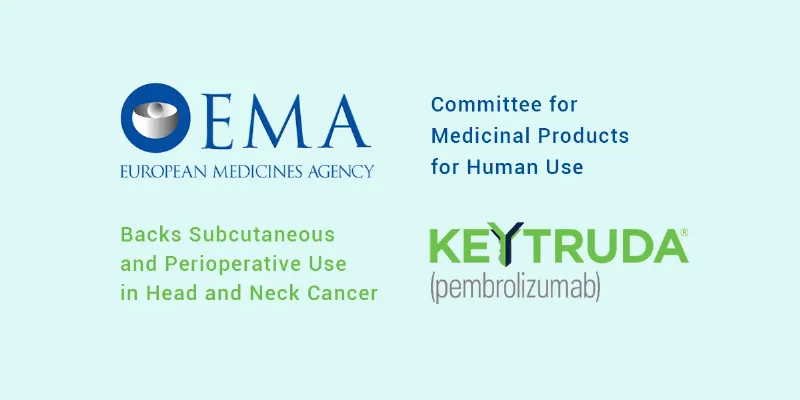EMA’s CHMP Backs Subcutaneous Pembrolizumab in Head and Neck Cancer

19 September 2025
The European Medicines Agency’s Committee for Medicinal Products for Human Use (CHMP) has adopted two positive opinions for Merck’s anti–PD-1 therapy pembrolizumab (KEYTRUDA®), potentially expanding its use in Europe to include a new subcutaneous (SC) formulation and a new perioperative indication in resectable locally advanced head and neck squamous cell carcinoma (LA-HNSCC). Final decisions from the European Commission (EC) are expected in Q4 2025.
The first opinion supports approval of a subcutaneous formulation, KEYTRUDA SC™, which would be administered by healthcare providers in one to two minutes. Dosing schedules under review include 395 mg every three weeks or 790 mg every six weeks. If authorized, this option would apply to all adult indications currently approved for pembrolizumab in the EU, potentially offering greater convenience and flexibility across oncology settings.
“Building on the legacy of KEYTRUDA, we are committed to driving innovation in cancer care with new routes of administration and indications in difficult-to-treat and earlier stages of cancer,” said Dr. Marjorie Green, SVP and head of oncology, global clinical development, Merck Research Laboratories. “If approved, we believe KEYTRUDA SC has the potential to provide meaningful benefits to patients and providers in Europe because it can offer a shorter administration time compared to KEYTRUDA and the option to receive treatment in additional health care settings.”
KEYTRUDA SC combines pembrolizumab with berahyaluronidase alfa, a recombinant human hyaluronidase variant developed by Alteogen Inc. Regulatory submissions are supported by data from the pivotal 3475A-D77 trial in previously untreated metastatic non–small cell lung cancer (NSCLC) without EGFR, ALK, or ROS1 alterations.
The trial demonstrated pharmacokinetic equivalence between subcutaneous and intravenous formulations, with secondary efficacy analyses showing consistent objective response rates (45.4% vs 42.1%) and progression-free survival outcomes when each was combined with chemotherapy. Results were presented at the European Lung Cancer Congress (ELCC) 2025 and published in Annals of Oncology. A parallel U.S. application is under FDA review with a decision expected in September 2025.
Perioperative Use in Head and Neck Cancer
The second CHMP opinion recommends approval of pembrolizumab as part of a perioperative regimen for patients with resectable LA-HNSCC whose tumors express PD-L1 with a combined positive score (CPS) ≥1. If authorized, pembrolizumab would be given as neoadjuvant monotherapy, continued as adjuvant therapy in combination with radiotherapy with or without cisplatin, and maintained as monotherapy thereafter—making it the first perioperative anti–PD-1 option for this patient population in the EU.
The recommendation is based on Phase 3 KEYNOTE-689, which demonstrated a statistically significant and clinically meaningful improvement in event-free survival (EFS) versus standard adjuvant radiotherapy ± cisplatin. Results were presented at the 2025 AACR Annual Meeting and published in The New England Journal of Medicine in June 2025. Pembrolizumab received FDA approval for this indication in June 2025.
Background on KEYTRUDA
Pembrolizumab is a humanized monoclonal antibody targeting the programmed death receptor-1 (PD-1). By blocking PD-1 interaction with PD-L1 and PD-L2, pembrolizumab enhances T-cell activity against tumor cells. Merck continues to lead the immuno-oncology research landscape, with more than 1,600 clinical trials investigating pembrolizumab across multiple tumor types and treatment settings.











Comments
No Comments Yet!